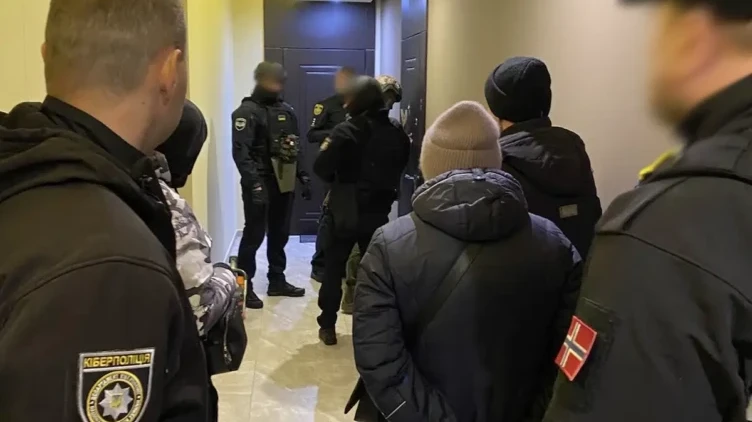Ukraine Gets Serious About Combatting Homegrown Cybercrime
Authors:
• SCARS Editorial Team – Society of Citizens Against Relationship Scams Inc., and
• EUROPOL
Dismantlement Of Ransomware Group In Ukraine Amidst Ongoing War – An International Collaboration Success
The Ukraine ransomware gang is behind high-profile attacks that created losses of hundreds of millions of euros
In an unprecedented effort, law enforcement and judicial authorities from seven countries have joined forces with Europol and Eurojust to dismantle and apprehend in Ukraine the key figures behind significant ransomware operations wreaking havoc across the world. The operation comes at a critical time, as the country grapples with the challenges of Russia’s military aggression against its territory.
Ransomware Shut Down
On 21 November, 30 properties were searched in the regions of Kyiv, Cherkasy, Rivne, and Vinnytsia in Ukraine, resulting in the arrest of the 32-year-old ringleader. Four of the ringleader’s most active accomplices were also detained.
More than 20 investigators from Norway, France, Germany, and the United States were deployed to Kyiv to assist the Ukrainian National Police with their investigative measures. This setup was mirrored from Europol’s headquarters in the Netherlands where a virtual command post was activated to immediately analyze the data seized during the house searches in Ukraine.
This latest action follows a first round of arrests in 2021 in the framework of the same investigation. Since then, a number of operational sprints have been organized at Europol and in Norway with the aim of forensically analyzing the devices seized in Ukraine in 2021. This forensic follow-up work facilitated the identification of the suspects targeted during the action last week in Kyiv.
Dangerous, Undetected and Versatile
The individuals under investigation are believed to be part of a network responsible for a series of high-profile ransomware attacks against organizations in 71 countries.
These cyber actors are known for specifically targeting large corporations, effectively bringing their businesses to a standstill. They deployed LockerGoga, MegaCortex, HIVE, and Dharma ransomware, among others, to carry out their attacks.
The suspects had different roles in this criminal organization
Some of them are thought to be involved in compromising the IT networks of their targets, while others are suspected of being in charge of laundering cryptocurrency payments made by victims to decrypt their files.
Those responsible for breaking into networks did so through techniques including brute force attacks, SQL injections, and sending phishing emails with malicious attachments in order to steal usernames and passwords.
Once inside the networks, the attackers remained undetected and gained additional access using tools including TrickBot malware, Cobalt Strike, and PowerShell Empire, in order to compromise as many systems as possible before triggering ransomware attacks.
The investigation determined that the perpetrators encrypted over 250 servers belonging to large corporations, resulting in losses exceeding several hundreds of millions of euros.
International Cooperation
Initiated by the French authorities, a joint investigation team (JIT) was set up in September 2019 between Norway, France, the United Kingdom, and Ukraine, with financial support from Eurojust and assistance from both Agencies. The partners in the JIT have since been working closely together, in parallel with the independent investigations of the Dutch, German, Swiss, and U.S. authorities, to locate the threat actors in Ukraine and bring them to justice.
This international cooperation has remained steadfast and uninterrupted, persisting even amid the challenges posed by the ongoing war in Ukraine.
A Ukrainian cyber police officer was initially seconded to Europol for two months to prepare for the first phase of the action, before being deployed to Europol permanently to facilitate law enforcement cooperation in this field.
From the onset of the investigation, Europol’s European Cybercrime Centre (EC3) hosted operational meetings, providing digital forensic, cryptocurrency and malware support, and facilitating the information exchange in the framework of the Joint Cybercrime Action Taskforce (J-CAT) hosted at Europol’s headquarters.
Eurojust hosted twelve coordination meetings to facilitate the communication and judicial cooperation between the authorities involved.
The forensic analysis carried out in the framework of this investigation also allowed the Swiss authorities to develop, together with the No More Ransom partners and Bitdefender, decryption tools for the LockerGoga and MegaCortex ransomware variants. These decryption tools have been made available for free on: www.nomoreransom.org.
Participating Authorities:
- Norway: National Criminal Investigation Service (Kripos)
- France: Public Prosecutor’s Office of Paris, National Police (Police Nationale – OCLCTIC)
- Netherlands: National Police (Politie), National Public Prosecution Service (Landelijk Parket, Openbaar Ministerie)
- Ukraine: Prosecutor General’s Office (Офіс Генерального прокурора), National Police of Ukraine (Національна поліція України)
- Germany: Public Prosecutor’s Office of Stuttgart, Police Headquarters Reutlingen (Polizeipräsidium Reutlingen) CID Esslingen
- Switzerland: Swiss Federal Office of Police (fedpol), Polizei Basel-Landschaft, Public Prosecutor’s Office of the Canton of Zurich, Zurich Cantonal Police
- United States: United States Secret Service (USSS), Federal Bureau of Investigation (FBI)
- Europol: European Cybercrime Centre (EC3)
- Eurojust
The investigation benefited from funding from the European Multidisciplinary Platform Against Criminal Threats (EMPACT).
More:
- Euro Phishing Gang Shut Down Europol & Partners – 2023 (scamsnow.com)
- Crypto Seizure Breaking News: Major Romance & Pig Butchering Scam Organization Disrupted 2023 (scamsnow.com)
- Understanding Criminality – What Is Its Essence? 2023 (scamsnow.com)
- Cryptocurrencies – Europol Takes A Major Step Forward (scamsnow.com)
- Ragnar Locker Ransomware Gang Taken Down 2023 (scamsnow.com)
- EUROPOL Report: Money-Laundering Criminals Are Adapting To New Technology Faster Than Authorities Can Keep Up (scamsnow.com)
- Scams and Cryptocurrency Go Hand in Hand (scamsnow.com)
- Israel Police Bust Major Investment Fraud Organization (scamsnow.com)
- Qakbot Botnet Infrastructure Shattered After An International Operation Led By FBI/Europol Takes It Down (scamsnow.com)
- INTERPOL Identified Networks Linked to Financial Losses of More Than USD $40 Million (scamsnow.com)
- 16shop Phishing-As-A-Service Platform Taken Down (scamsnow.com)
- Cybercriminals Operating Major Ransomware Hosting Service Arrested In Poland (scamsnow.com)
- Interpol Operation Jackal – Arrested Over 100 (scamsnow.com)
- Europol Arrests 70 Phone Scammers Plus Kingpin (scamsnow.com)
SCARS Resources:
- For New Victims of Relationship Scams newvictim.AgainstScams.org
- Subscribe to SCARS Newsletter newsletter.againstscams.org
- Sign up for SCARS professional support & recovery groups, visit support.AgainstScams.org
- Find competent trauma counselors or therapists, visit counseling.AgainstScams.org
- Become a SCARS Member and get free counseling benefits, visit membership.AgainstScams.org
- Report each and every crime, learn how to at reporting.AgainstScams.org
- Learn more about Scams & Scammers at RomanceScamsNOW.com and ScamsNOW.com
- Global Cyber Alliance ACT Cybersecurity Tool Website: Actionable Cybersecurity Tools (ACT) (globalcyberalliance.org)
- Self-Help Books for Scam Victims are at shop.AgainstScams.org
- Donate to SCARS and help us help others at donate.AgainstScams.org
- Worldwide Crisis Hotlines: International Suicide Hotlines – OpenCounseling : OpenCounseling
- Campaign To End Scam Victim Blaming – 2024 (scamsnow.com)
-/ 30 /-
What do you think about this?
Please share your thoughts in a comment below!
More ScamsNOW.com Articles
-/ 30 /-
What do you think about this?
Please share your thoughts in a comment above!
SCARS LINKS: AgainstScams.org RomanceScamsNOW.com ContraEstafas.org ScammerPhotos.com Anyscam.com ScamsNOW.com
reporting.AgainstScams.org support.AgainstScams.org membership.AgainstScams.org donate.AgainstScams.org shop.AgainstScams.org
youtube.AgainstScams.org linkedin.AgainstScams.org facebook.AgainstScams.org
ARTICLE RATING
TABLE OF CONTENTS
META
CATEGORIES
MOST POPULAR COMMENTED ARTICLES
POPULAR ARTICLES
U.S. & Canada Suicide Lifeline 988
![NavyLogo@4x-81[1]](https://scamsnow.com/wp-content/uploads/2025/04/NavyLogo@4x-811.png)
WHAT PEOPLE ARE TALKING ABOUT
LATEST SITE COMMENTS
See Comments for this Article at the Bottom of the Page
on Vulnerability to Scams Caused by Past Relationships is Like a River Running through Your Life Cutting Channels – 2025: “My big take away from this article is that there are many layers to my vulnerability. Yes, losing my Mom…” May 8, 11:43
on Hate for Scammers and Criminals Feels So Good But is So Bad for Scam Victims – 2025: “As stated here it feels like it should be justified – to hate them. I never did feel that way,…” May 6, 17:32
on Scam Victims Suppressing Trauma Or Avoiding Recovery And Healing 2024: “This is a great article that will, hopefully, help when I am avoiding facing my emotions/triggers. Recognizing the signs and…” May 6, 16:47
on SCARS 5 Coping Techniques For Traumatized Scam Victims – 2023: “One of the best ways of coping for me has been to reconnect with my friends. I self-isolated for months…” May 6, 16:07
on Trauma Recollection/Traumatic Flashbacks And Scam Victim PTSD – Recovery Psychology – 2023: “I don’t feel like my trauma can be described as PTSD. The affects after the scam ended were severe anxiety,…” May 6, 15:55
on Selective Amnesia and Scam Victim Psychological Trauma 2023: “This was a very interesting article to me. I have not experienced selective amnesia in relation to the scam. However,…” May 6, 15:39
on Psychological Triggers/Emotional Triggers – What They Are And How They Work – 2023/2024: “Not long after my scam ended, I needed to go to the grocery store. It never crossed my mind that…” May 6, 14:48
on Learning And The Challenges That A Scam Victim Faces From Trauma And Related Cognitive Effects – 2024: “My cognitive impairment was bad right after my scam. However, I have now noticed that it was especially bad during…” May 6, 14:23
on Hate for Scammers and Criminals Feels So Good But is So Bad for Scam Victims – 2025: “This is all true and valid. I had to forgive myself first for trusting my abuser because he hurt my…” May 6, 10:08
on Nirvana and the Path to Letting Go of Suffering – 2025: “En mi experiencia podría describir el nirvana en mi recuperación como ese estado de paz profunda y liberación emocional que…” May 5, 18:58
on The Prodigal Son or Daughter – Returning ‘Home’ After the Scam – 2025: “It’s true that the judgment of others does not define my path but if after “coming home” those closest to…” May 5, 13:21
on Beginning Again and Scam Victim Recovery -2025: “Taking action is the first step to recovery and I am doing that and becoming a newer stronger version of…” May 5, 09:53
on Beginning Again and Scam Victim Recovery -2025: “In order not to let this deception define me, since its discovery I have been ACTING.” May 5, 07:22
on The Butterfly Effect And Scam Victims – 2024: “Very good and interesting analogy to the Butterfly Effect and how it pertains to scams. In my crime I can…” May 4, 14:51
on Faith And Why It Matters In Scam Victim Recovery – 2024: “This is a good article giving examples of the difference between faith in oneself and one’s core values – to…” May 4, 13:37
on Reclaiming Your Worth: A Scam Survivor’s Guide to Navigating Your Worthiness After a Scam – 2023: “As an individual I process my emotions slowly whether it is shock, trauma, anger, disbelief. In the cycle of recovery…” May 4, 12:54
on The Stain that Never Goes Away After a Romance Scam for Scam Victims – 2025: “Thank you for sharing this important step on recovery” May 4, 12:09
on Metanoia – The Transformation for Traumatized Scam Victims – 2025: “Excelente articulo!!!… Después de superar la estafa podría describir la metanoia en mi propia experiancia como un renacimiento interior, una…” May 4, 00:24
on Philosophy of Life Planning – From Chaos to Order and the Scam Victim Recovery Path Forward – 2025: “Seeking justice is, unfortunately, not justice. Anger and revenge is not justice either. Recovery is justice. The only justice for…” May 3, 21:16
Important Information for New Scam Victims
Please visit www.ScamVictimsSupport.org – a SCARS Website for New Scam Victims & Sextortion Victims
SCARS Institute now offers a free recovery program at www.SCARSeducation.org
Please visit www.ScamPsychology.org – to more fully understand the psychological concepts involved in scams and scam victim recovery
If you are looking for local trauma counselors, please visit counseling.AgainstScams.org
If you need to speak with someone now, you can dial 988 or find phone numbers for crisis hotlines all around the world here: www.opencounseling.com/suicide-hotlines
Statement About Victim Blaming
Some of our articles discuss various aspects of victims. This is both about better understanding victims (the science of victimology) and their behaviors and psychology. This helps us to educate victims/survivors about why these crimes happened and not to blame themselves, better develop recovery programs, and help victims avoid scams in the future. At times, this may sound like blaming the victim, but it does not blame scam victims; we are simply explaining the hows and whys of the experience victims have.
These articles, about the Psychology of Scams or Victim Psychology – meaning that all humans have psychological or cognitive characteristics in common that can either be exploited or work against us – help us all to understand the unique challenges victims face before, during, and after scams, fraud, or cybercrimes. These sometimes talk about some of the vulnerabilities the scammers exploit. Victims rarely have control of them or are even aware of them, until something like a scam happens, and then they can learn how their mind works and how to overcome these mechanisms.
Articles like these help victims and others understand these processes and how to help prevent them from being exploited again or to help them recover more easily by understanding their post-scam behaviors. Learn more about the Psychology of Scams at www.ScamPsychology.org
SCARS INSTITUTE RESOURCES:
IF YOU HAVE BEEN VICTIMIZED BY A SCAM OR CYBERCRIME
♦ If you are a victim of scams, go to www.ScamVictimsSupport.org for real knowledge and help
♦ Enroll in SCARS Scam Survivor’s School now at www.SCARSeducation.org
♦ To report criminals, visit https://reporting.AgainstScams.org – we will NEVER give your data to money recovery companies like some do!
♦ Sign up for our free support & recovery help by https://support.AgainstScams.org
♦ Join our WhatsApp Chat Group at: https://chat.whatsapp.com/BPDSYlkdHBbDBg8gfTGb02
♦ Follow us on X: https://x.com/RomanceScamsNow
♦ Follow us and find our podcasts, webinars, and helpful videos on YouTube: https://www.youtube.com/@RomancescamsNowcom
♦ SCARS Institute Songs for Victim-Survivors: https://www.youtube.com/playlist…
♦ See SCARS Institute Scam Victim Self-Help Books at https://shop.AgainstScams.org
♦ Learn about the Psychology of Scams at www.ScamPsychology.org
♦ Dig deeper into the reality of scams, fraud, and cybercrime at www.ScamsNOW.com and www.RomanceScamsNOW.com
♦ Scam Survivor’s Stories: www.ScamSurvivorStories.org
♦ For Scam Victim Advocates visit www.ScamVictimsAdvocates.org
♦ See more scammer photos on www.ScammerPhotos.com
You can also find the SCARS Institute on Facebook, Instagram, X, LinkedIn, and TruthSocial
Psychology Disclaimer:
All articles about psychology and the human brain on this website are for information & education only
The information provided in this and other SCARS articles are intended for educational and self-help purposes only and should not be construed as a substitute for professional therapy or counseling.
Note about Mindfulness: Mindfulness practices have the potential to create psychological distress for some individuals. Please consult a mental health professional or experienced meditation instructor for guidance should you encounter difficulties.
While any self-help techniques outlined herein may be beneficial for scam victims seeking to recover from their experience and move towards recovery, it is important to consult with a qualified mental health professional before initiating any course of action. Each individual’s experience and needs are unique, and what works for one person may not be suitable for another.
Additionally, any approach may not be appropriate for individuals with certain pre-existing mental health conditions or trauma histories. It is advisable to seek guidance from a licensed therapist or counselor who can provide personalized support, guidance, and treatment tailored to your specific needs.
If you are experiencing significant distress or emotional difficulties related to a scam or other traumatic event, please consult your doctor or mental health provider for appropriate care and support.
Also read our SCARS Institute Statement about Professional Care for Scam Victims – click here
If you are in crisis, feeling desperate, or in despair, please call 988 or your local crisis hotline.
More ScamsNOW.com Articles
A Question of Trust
At the SCARS Institute, we invite you to do your own research on the topics we speak about and publish. Our team investigates the subject being discussed, especially when it comes to understanding the scam victims-survivors’ experience. You can do Google searches, but in many cases, you will have to wade through scientific papers and studies. However, remember that biases and perspectives matter and influence the outcome. Regardless, we encourage you to explore these topics as thoroughly as you can for your own awareness.















![scars-institute[1]](https://scamsnow.com/wp-content/uploads/2025/04/scars-institute1.png)
![niprc1.png1_-150×1501-1[1]](https://scamsnow.com/wp-content/uploads/2025/04/niprc1.png1_-150x1501-11.webp)
